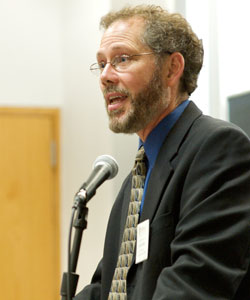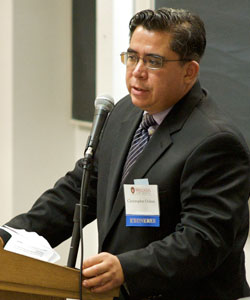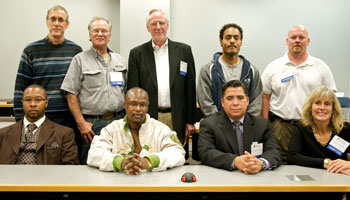
Approximately 150 law students have devoted their time and talents to the Innocence Project since its 1998 launch, said Keith Findley, the project co-founder and UW clinical professor.
Nov. 4, 2009 – Ten is the number of years of operation the Wisconsin Innocence Project celebrated in a ceremony at the University of Wisconsin Law School on Oct. 23. But there were so many other numbers to mark the occasion.
Approximately 150 law students have devoted their time and talents to the Innocence Project since its launch in September 1998, said Keith Findley, the project co-founder and UW clinical professor.
A dozen wrongfully convicted individuals have had their freedom restored thanks to the group’s efforts.
But one of those exonerated individuals gave special voice to the aspirations of the program. Christopher Ochoa, freed from a Texas prison by the Innocence Project in 2001, received the organization’s Freedom Award in recognition of his decisions to finish an undergraduate degree upon his return to society, enter the UW Law School, and practice criminal defense law in Madison.
“I know I am from Texas, but I feel like my heart is in Wisconsin,” Ochoa said of his connection to the law school, its students, and the state of Wisconsin.
A false confession
Police had few leads and no obvious suspects when they set out in 1988 to solve the rape and murder of Nancy DePriest in Austin, Texas.
Ochoa had no prior criminal record and he never knew DePriest. But police zeroed in on him and his friend Richard Danziger when employees of the Pizza Hut at which DePriest was murdered told law enforcement that they had overheard the two men asking questions about the crime.
During two 12-hour interrogation sessions, detectives repeatedly told Ochoa that they knew he had murdered DePriest. They cut off and ignored his repeated denials. They lied to him, saying they had strong evidence against him. They told him that he would face execution if he did not confess. Ochoa eventually broke down.
Ochoa told his court-appointed attorney that his confession was false, but his attorney did not believe him and conducted no investigation. Instead, the attorney pressured Ochoa to plead guilty to avoid execution. As part of his plea deal, Ochoa testified against Danziger. Both men were convicted and sentenced to life in prison.
A decade later, a convicted serial rapist named Achim Marino contacted authorities from his prison cell and stated that he alone had killed DePriest. But Marino was ignored because Ochoa's confession seemed airtight. Attorneys with the Innocence Project arranged for DNA testing on semen found in the rape kit, which indisputably identified Marino as the real killer. Ochoa was released after serving 12 year for crimes he did not commit.
But Ochoa’s involvement with the Innocence Project did not end there.
Life after prison
“I remember after my exoneration, [Innocence Project co-founder] Professor John Pray, pulled me aside and he said, ‘You know, if for some reason you find you don’t have support out here, we’re not just going to leave you out here. We’re going to try to help you with a job, try to help you with whatever we can,’” Ochoa recalled in his award acceptance remarks.
“And they did,” he said.
“I remember that day, the Innocence Project students had $700 which they had collected from the law school,” Ochoa continued. “Literally, when I walked out [of prison], I had to buy a toothbrush, I had to buy a belt. … Somebody mentioned we only have our clothes on our back, but sometimes we don’t even have the clothes on our back. I didn’t even get my bus ticket that I was promised by the Texas Prison system.”

Christopher Ochoa, freed from a Texas prison by the Innocence Project in 2001, received the Freedom Award in recognition of his decisions to finish undergraduate degree upon his return to society, earn his law degree at the U.W. Law School, and practice criminal defense law in Madison.
A place among lawyers
Ochoa said that he returned to his hometown of El Paso and finished his undergraduate degree. After that, he said he found that “the legal profession was where I belonged.”
“As an exoneree, sometimes it is really difficult to fit into society after so many years,” Ochoa said. “A lot of people were very, very helpful and very giving. But sometimes you don’t fit in. You’re too old for the young crowd, the old crowd thinks, ‘Well, this guy is out of touch.’”
“The legal profession seemed like a natural fit,” Ochoa said. “I had traveled around the country. I had been to the law school here a couple of times. I went to the law schools in New York City and Northwestern ... And everywhere I went, I felt comfortable with the law students. I felt comfortable with attorneys.”
So Ochoa said he decided to apply to law school and Wisconsin was an obvious choice. Completing the full reversal of fortunes, Ochoa became an Innocence Project student.
Heavily influenced
Ochoa credits the Innocence Project with shaping his “meticulous” approach to the practice of law. As he was shown in the Innocence Project, every piece of evidence is scrutinized for something a district attorney or a police officer missed or for a lead to some other new evidence.
But when he graduated from law school, Ochoa admitted that he was unsure if he even wanted to practice criminal law. “It was too emotional for me,” he said.
“It can get emotional, and one thing I do know is that there’s no room for emotion in the law,” Ochoa said. “Passion, yes – but if I get too emotional, then I’ll be doing a disservice to the clients and to the justice system and to the community.”
“Fortunately, I learned to deal with my emotions by being a student prosecutor in my third year,” Ochoa said, explaining that in this position he put into practice the Innocence Project’s insistence on strict obedience to statute.
After graduation, Ochoa said he let a friend talk him into taking misdemeanor cases from the State Public Defender.
“And then I started taking felonies,” Ochoa said. Soon, he said, his solo practice had “turned into a full-blown criminal law practice.”

Nine of the 12 wrongfully convicted individuals who have the Innocence Project to thank for their restored freedom attend the project’s 10th anniversary celebration at the UW Law School.
A lasting impact
Ochoa shared a story to explain how his long relationship with the Innocence Project has shaped his approach to the practice of law.
“I have a client who came in to me, and from the very first day he said he was innocent,” Ochoa said. “And I believed him.”
“When it came time to meet with the district attorney about maybe [making] a plea offer – before he could even get the plea offer out of the folder – I said, ‘You need to put your plea offer away because we’re going to trial. There’s no plea here ... Unless you want to prosecute people who didn’t do it,’” Ochoa said.
Although that might not have been the most politic thing to say, Ochoa said that “it actually made an impact with the prosecutor.”
“As I went along and I looked at the case, I saw that this person didn’t do this. I found so many inconsistencies,” Ochoa said. “At the final status conference before the trial, I looked at the DA and pointed out all the inconsistencies – ‘this is where your officer lied to you; this is on paper.’”
Calling it one of his proudest moments, Ochoa said the prosecutor decided to dismiss all charges against his client.
“I think that’s what practicing law, for me, is all about – hoping that my presence will help make a difference when a prosecutor is considering to bring a case,” Ochoa said. “Because although there’s always the trial, I would prefer for my client not to have to take the chance at that trial if I can get it dismissed by the prosecutor.”
‘Forever grateful’
“The Innocence Project is always there on my mind,” Ochoa said. “They are a big part of what I am and I hope everything that I do as an attorney I hope I convey that to the judges, the prosecutors, law enforcement, other defense attorneys.”
“I will forever be grateful to them for that because if it hadn’t been for the Wisconsin Innocence Project I wouldn’t be here today,” Ochoa said.” I wouldn’t be a practicing attorney. I just wouldn’t be the person I am.”
Photos: UW Law School; Will Dalsen, photographer
Related: Study Suggests Causes of and Ways to Prevent False Confessions (Wisconsin Lawyer, May 2007)
Related: DNA Evidence: Freeing the Innocent (Wisconsin Lawyer, April 2001)
